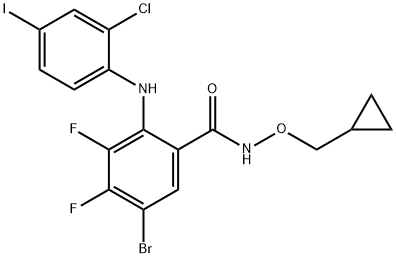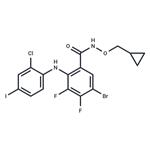A novel mitogen-activated protein kinase kinase (MEK) inhibitor shown to exhibit antitumor effects and suppress MEK-extracellular signal-related kinase signaling activity and cell proliferation in human hepatocellular carcinoma cells and in human hepatocellular carcinoma xenografts.
A cell-permeable, blood-brain barrier permeant, and orally active hydroxamate compound that is reported to inhibit MEK activity (IC50 = 10-100 nM) without competing against ATP or Erk binding and exhibit excellent selectivity over 27 other cellular kinases, including JNK, MAPK2/ERK2, SAPK2a, SAPK2b, SAPK3, and SAPK4 (IC50 >10 M). Shown to be superior to PD 98059 and U0126 in suppressing Erk1/2 phosphorylation in Hep3B, HepG2, PLC, and SKHep human liver cancer cells (IC50<0.1 M) in vitro and effectively reduce Erk1/2 phosphorylation in hippocampal tissue in mice (ED50<50 mg/kg, i.p.) in vivo. Both PD184161 and U0126 are shown to induce necrosis of several types of glucose-deprived cells via an indirect action on the F0 component of the mitochondrial F1F0-ATPase/synthase.
pd 184161 is a mek1/2 inhibitor.the intracellular signaling pathway of mitogen-activated protein kinases is involved in the regulation of various cellular functions. one of these pathways, named raf/mek/erk pathway, plays a key role in the regulation of cellular differentiation, growth, and proliferation. the modulation of this raf/mek/erk pathway has been reported as a useful approach to treate proliferative disorders such as cancer.
PD-184161 is a MEK inhibitor.
previous study found that pd184161 could inhibit mek activity in a time- and concentration-dependent manner, which was more effectively than pd098059 or u0126. moreover, pd184161 could inhibit cell proliferation and induce apoptosis at concentrations of > or = 1.0 μm time- and concentration-dependently [1].
animal study showd that tumor xenograft p-erk levels were significantly reduced 3 to 12 hours after an oral dose of pd184161. contrarily, tumor xenograft p-erk levels following long-term treatment of pd184161 were refractory to this signaling effect. pd184161 also significantly suppressed tumor engraftment and initial growth, however, established tumors were not significantly affected. in summary, pd184161 has antitumor effects in hcc in vivo that appear to correlate with suppression of mek activity [1].
[1] klein, p. j.,schmidt, c.m.,wiesenauer, c.a., et al. the effects of a novel mek inhibitor pd184161 on mek-erk signaling and growth in human liver cancer. neoplasia 8(1), 1-8 (2006).

